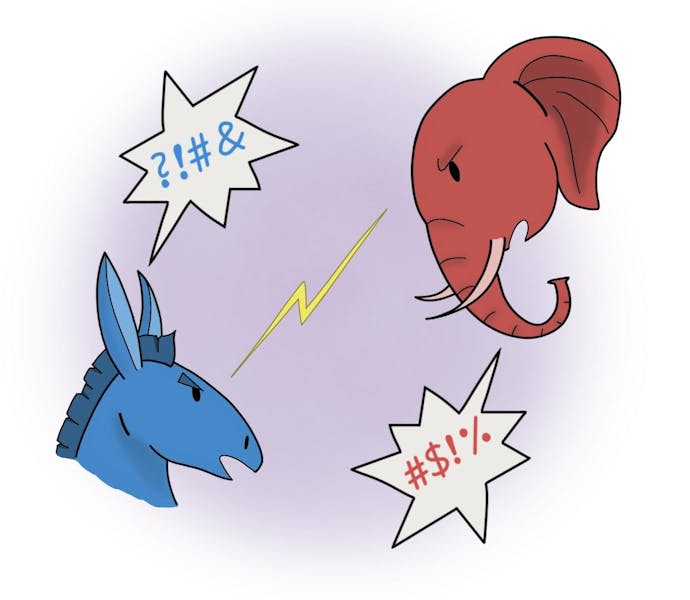The U.S. government shut down for the first time since 2018 on Oct. 1. The shutdown occurred because of a lack of agreement between Democrats and Republicans to come to an agreement on a bill to fund government services for the months to come. Four shutdowns have occurred within the past decade, all under U.S. President Donald Trump. The recent shutdown reflects the steadfast increase of polarization in politics, a phenomenon that can partly be attributed to a shift in the way politicians treat their opponents. Trump himself exemplifies why it has become so difficult for politicians to agree on a simple budget bill. At the memorial service for Turning Point USA founder Charlie Kirk, he notably mentioned that he disagreed with Kirk on how he regarded his political opponents.
“He did not hate his opponents, he wanted the best for them,” Trump said. “That’s where I disagreed with Charlie. I hate my opponent and I don’t want the best for them.”
Trump’s perspective should not come as a surprise to the majority of Americans who have seen the way he has engaged with his political opponents during all three of his presidential campaigns. He called former U.S. Secretary of State Hilary Clinton “the devil,” former President Joe Biden “low I.Q.” and former Vice President Kamala Harris “mentally impaired.” His comments at Kirk’s funeral only clarified his existing ideology — political opponents should not be treated with respect.
Trump is by no means alone in his hostile treatment of his fellow politicians. Biden would often fire back at Trump by calling him a “sucker” and a “loser,” and Harris once remarked that Trump was “unhinged.” These prominent politicians’ remarks reflect a growing trend in politics of hurling nasty insults at opponents instead of engaging with the substance of their arguments. The erosion of politeness in political spaces takes political debate to an uncomfortably personal level. Politicians not only treat their opponents as if they have bad ideas but also as if they are not worthy as human beings. This dehumanizing treatment creates an “us versus them” mentality in politics, fueling political polarization that disrupts basic government functioning.
Politeness takes the form of relatively simple actions in everyday life: holding the door open for the next person, smiling at a peer or asking a cashier how their day is going. Many people disregard polite acts as trivial because these small deeds of kindness seem as if they have little impact or meaning in people’s lives, but they could not be more wrong. Small, seemingly insignificant acts such as asking about one’s day serve to acknowledge the other person’s humanity. Politeness is not just a means to get something you want – it signals to other people that they deserve to be treated with respect.
The same principles apply to politics. When politicians act as if their opponents are scum on the bottom of their shoes, they signal to the general population that it is acceptable to dehumanize members of opposing political parties. It is no coincidence that as politicians have shown less and less respect for their opponents, the American people have also shown less respect for their fellow citizens, creating a climate of extreme polarization.
About a decade ago, politeness existed in politics. Rather than politicians firing personal insults back and forth, they showcased a genuine respect for their opponents. In a 2012 NPR article, political reporters described the presidential debates between former President Barack Obama and former Sen. Mitt Romney (R-Utah) as “sometimes spirited, but always cordial.” Obviously, not every comment made in 2012 was polite, but politicians were always courteous during debates. In contrast, recent elections have seen candidates being much more rude to one another. A PBS commentary described the 2024 presidential debate between Trump and Harris as “fiery and contentious,” with politeness virtually absent. Political debate has evolved from respectable to downright disgraceful, foiling fruitful discourse.
A Pew Research Center study confirms that the shift towards increased hostility in how politicians treat one another comes with an increase in the American people viewing members of the opposing party as morally inferior. In 2016, 47% of Democrats and 35% of Republicans regarded people of the opposing party as more immoral than them, and in 2022, those numbers grew to 63% for Democrats and 72% for Republicans, displaying a stark increase in political polarization in under a decade. Polite behavior is, therefore, directly correlated with the proliferation of polarization.
This proliferation over the past decade reveals an important truth: The American political system cannot effectively function without politeness. When politicians attack their opponents for their character and not their policies, they undermine the productive debates essential to a democratic system. The recent government shutdown is just one example of this erosion of productivity. Both politicians and constituents are becoming less willing to compromise with their opponents or even listen to their ideas because they view the opposing party as morally inferior. As a result of this political friction, meaningful dialogue is disappearing, hindering attempts towards compromise and progress that benefits all Americans.
To restore any sense of bipartisanship in America, politicians must return to treating their opponents with dignity. They are our role models and thus should extend the same respect to their opposing party as ordinary people should. But, even if our politicians do not change their behavior, we still must be careful when engaging in political discussion and debate. We must listen to everyone’s perspectives with intention and treat them with respect, even if we disagree with their viewpoints. Extend this respect outside of political conversations, too. Hold the door open for the person behind you, smile at a peer passing by and ask the cashier about their day. If we let politeness erode, we all stand to lose.
Contact Emma Monroe at emma.monroe@emory.edu
